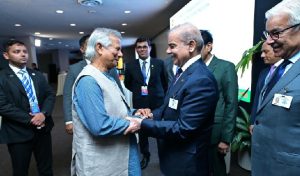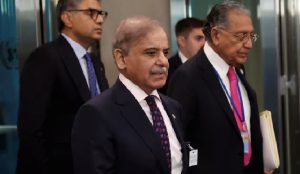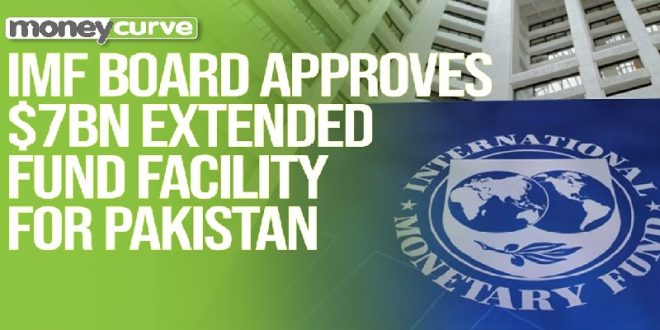28-09-2024
WASHINGTON/ ISLAMABAD: The International Monetary Fund (IMF) has approved a new $7bn loan for cash-strapped Pakistan, authorities said, more than two months after the two sides said they had reached an agreement.
Prime Minister Shehbaz Sharif in a statement on Wednesday hailed the deal that his team had been negotiating with the IMF since June. He thanked Kristalina Georgieva, the head of the IMF and her team, for the approval.
 Islamabad had been working on implementing conditions that Sharif had previously called “strict” from the IMF to complete the 37-month loan program, which the country hopes will be its last.
Islamabad had been working on implementing conditions that Sharif had previously called “strict” from the IMF to complete the 37-month loan program, which the country hopes will be its last.
Sharif, on the sidelines of the United Nations General Assembly, told Pakistani media that the country had fulfilled all of the lender’s conditions, with help from China and Saudi Arabia.
“Without their support, this would not have been possible,” he said, without elaborating on what assistance Beijing and Riyadh had provided to get the deal over the line.
Earlier this month, Pakistan’s external debt stood at more than $130bn, with nearly 30 percent owed to China, its closest ally and a perceived rival to the Western bloc.
The country is due to repay almost $90bn over the next three years, with the next major payment due by December.
Rollovers or disbursements of loans from Pakistan’s longtime allies, in addition to financing from the IMF, have helped the country meet its external financing needs in the past.
The government has also vowed to increase its tax intake, in line with IMF requirements, despite protests in recent months by retailers and some opposition parties over the new tax scheme and high electricity rates.
Pakistan has been struggling with boom-and-bust economic cycles for decades, leading to 22 IMF bailouts since 1958. Currently, the country is the IMF’s fifth-largest debtor, owing $6.28bn as of July 11, according to the lender’s data.
The latest economic crisis has been the most prolonged and has seen Pakistan facing its highest-ever inflation, pushing the country to the brink of a sovereign default last summer before an IMF bailout.
 Inflation has since tempered, and credit ratings agency Moody’s has upgraded Pakistan’s local and foreign currency issuer and senior unsecured debt ratings to “Caa2” from “Caa3”, citing improving macroeconomic conditions and moderately better government liquidity and external positions.
Inflation has since tempered, and credit ratings agency Moody’s has upgraded Pakistan’s local and foreign currency issuer and senior unsecured debt ratings to “Caa2” from “Caa3”, citing improving macroeconomic conditions and moderately better government liquidity and external positions.
When Pakistan reached yet another staff-level agreement (SLA) with the International Monetary Fund (IMF) in July for a $7bn, three-year loan program, it was hailed as a lifeline for both the government, which had assumed office only months before, and the country itself, which was reeling under a severe economic crisis.
However, two months later, Pakistan is still waiting for the United States-based global lender’s approval of the program, Pakistan’s 25th since the first such bailout deal was signed in 1958.
The IMF executive board, responsible for ratifying SLAs and releasing funds, is yet to include Pakistan’s case on its agenda. The delay has fuelled speculation about whether the debt-hit country has failed to meet the IMF’s bailout conditions.
Earlier this week, Pakistan’s Deputy Prime Minister Ishaq Dar accused the IMF of “deliberately delaying” the release of funds.
“In the past two and a half years, efforts have been made to sabotage Pakistan’s critical negotiations with the IMF. There was geopolitics at play when Pakistan was close to default,” Dar said while attending an official event in London on September 8.
 Pressmediaofindia
Pressmediaofindia




